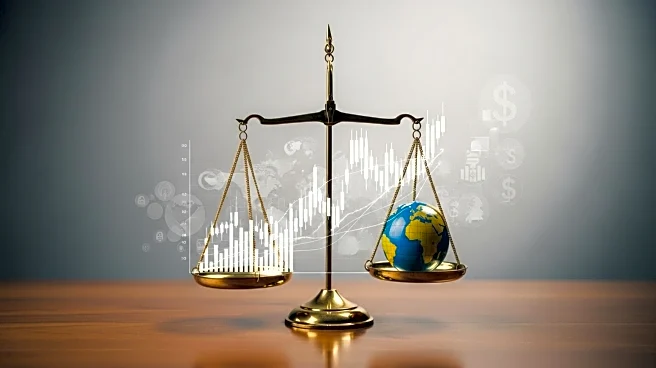What's Happening?
A U.S. Court of Appeals for the Federal Circuit has ruled that most of President Trump's tariffs, imposed under the International Emergency Economic Powers Act (IEEPA), are illegal. The court cited constitutional limits on executive authority over taxation, stating that the power to levy tariffs is reserved for Congress. This decision has led to significant market volatility, with the S&P 500 falling by 12.9% in 2025 as investors shift to safer assets like gold and fixed-income instruments. The ruling challenges the legal basis of tariffs that have imposed an estimated $71 billion in additional costs on U.S. small and medium-sized businesses, affecting global supply chains and production costs.
Why It's Important?
The court's decision underscores the tension between executive power and legislative authority in trade policy, highlighting the economic risks of politically driven tariffs. The ruling has prompted multinational corporations to accelerate shifts toward localized manufacturing and regional trade agreements, potentially fragmenting global supply chains. This fragmentation could lead to higher production costs and erode trust in multilateral trade systems. The legal uncertainty surrounding the tariffs has also affected investor confidence, with potential long-term economic impacts including a projected 6% GDP decline and a $22,000 lifetime income loss for middle-class households if tariffs remain.
What's Next?
The Supreme Court is expected to review the case, with a decision anticipated by October 14. If the Supreme Court upholds the lower court's ruling, it could lead to a congressional overhaul of trade policy, potentially resulting in higher, legally sanctioned tariffs. Conversely, if the ruling is reversed, future administrations may be emboldened to exploit IEEPA for similar measures, deepening economic uncertainty. The outcome will have significant implications for U.S. trade negotiations and could trigger a new wave of protectionist policies.
Beyond the Headlines
The legal battle over Trump's tariffs highlights broader issues of political risk and economic stability. The case serves as a litmus test for the resilience of global trade systems and investor confidence, emphasizing the link between executive overreach in trade policy and economic destabilization. As the Supreme Court deliberates, stakeholders must prepare for a world where supply chains are more fragmented, markets more volatile, and geopolitical tensions more intertwined with investment outcomes.










